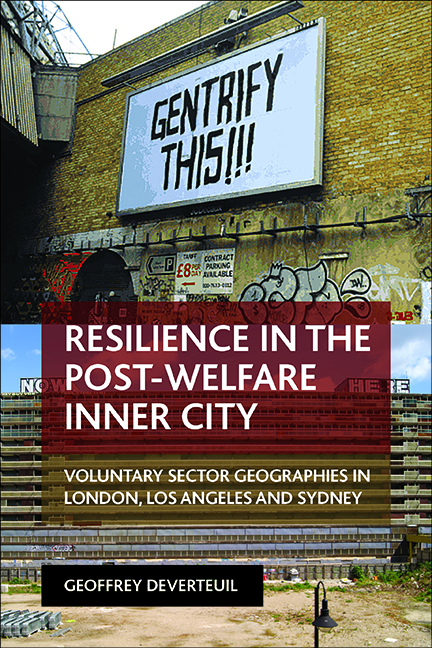 Resilience in the Post-Welfare Inner City
Resilience in the Post-Welfare Inner City Book contents
- Frontmatter
- Dedication
- Contents
- List of tables and figures
- About the author
- Acknowledgements
- Preface
- Part One Introducing resilience in the post-welfare inner city: conceptual and methodological considerations
- Part Two Case studies: spatial and social resilience in London, Los Angeles and Sydney
- Part Three Conclusions, critical resilience, commons and austerity
- References
- Index
four - Methodological approaches
Published online by Cambridge University Press: 10 March 2022
- Frontmatter
- Dedication
- Contents
- List of tables and figures
- About the author
- Acknowledgements
- Preface
- Part One Introducing resilience in the post-welfare inner city: conceptual and methodological considerations
- Part Two Case studies: spatial and social resilience in London, Los Angeles and Sydney
- Part Three Conclusions, critical resilience, commons and austerity
- References
- Index
Summary
In this chapter, I outline my methodological approach to the multisite, comparative project at hand. Strictly with regards to the literature on surplus populations and the voluntary sector, it is my opinion that a comprehensively laid-out, on-the-ground approach has frequently yielded more nuanced, fine-grained and systematic understandings than approaches that are more high altitude and cursory. With reference to the debates over urban punitiveness in Chapter Three, those studies that took a more grounded approach (for example, Cloke et al, 2010) presented a more ambivalent and supportive response to homelessness than the more desktop work by Davis (1990), Smith (1996) and Mitchell (2001), which presented an unacceptably clearcut and negative representation of street-level reality. This parallels how the voluntary sector was represented: while the more high-altitude work tended to denigrate and dismiss the voluntary sector as a neoliberal stooge, the more grounded work tended to provide a far more nuanced, if alternatively positive, portrayal of the sector. And so it is in this fine-grained and nuanced spirit that I proceed with my methodological outline. The chapter is divided into three sections: (1) the sample frame for the three global city-regions, the 10 inner-city areas and the 100 voluntary-sector organisations, referencing global cities theory; (2) an operationalisation of resilience and the threats to it, in the form of proxies and metrics of social and spatial resilience to the displacing logics of gentrification in the uneven post-welfare city; and (3) an exposition on the comparative methods, referencing the burgeoning literature on comparative urbanism and how it may inform (comparative) resilience among the voluntary sector.
Sampling frames
My sampling frame for voluntary-sector organisations within service hubs was limited to the 1998–2011 period, which overlapped with a consolidation of neoliberalism in Global North cities, state-sponsored gentrification and the fallout of significant welfare state restructuring in Australia, the UK and US, as well as the incipient impacts of the 2008 financial crisis and subsequent austerity. The study period also overlapped with the rebound in gentrification after the early 1990s recession and its intensification with the housing bubble of the mid-2000s.
- Type
- Chapter
- Information
- Resilience in the Post-Welfare Inner CityVoluntary Sector Geographies in London, Los Angeles and Sydney, pp. 55 - 82Publisher: Bristol University PressPrint publication year: 2015


